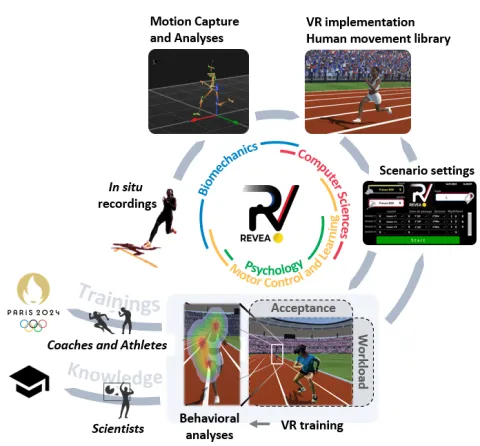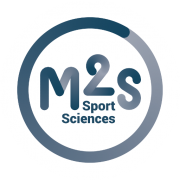Summary
The REVEA project proposes a new generation of innovative and complementary training methods and frameworks to increase the number of medals at Paris 2024 Olympic Games, thanks to virtual reality. It indeed offers standardization, reproducibility and control features that:
- densify and vary the training for very high performance without increasing the associated physical loads, and by reducing the risk of impact and/or high-intensity exercises;
- offer injured athletes the opportunity to continue training during their recovery period, or for all athletes during periods of lockdown as we experienced with Covid-19 disease;
- provide an objective and quantified assessment of athletes' performance and progress;
- offer a very varied training that allows a better retention of learning and adaptability of athletes. Virtual reality offers a range of stimuli that go beyond the boundaries of reality, such as facing an opponent with extraordinary abilities or living an action (with visual, auditory and haptic perceptions in an immersive context) not yet mastered.
The objective of REVEA is thus to meet the needs of the three federations of the consortium by exploiting the unique properties of virtual reality to improve the motor performance of athletes through the optimization of the underlying perceptual-motor and cognitive processes. The French Gymnastics Federation wishes to optimize the movements of their gymnasts through immersive action observation of their own motor production to avoid increasing even more the load of physical training. The French Boxing Federation wishes to improve the perceptual-motor anticipation skills of the boxers in opposition situations while reducing the impacts and thus the risk of injuries. The French Athletics Federation wishes to improve the perceptual-motor anticipation skills of the athletes in cooperative situations (4x100m relay) without running at high-intensity.
Objective
The REVEA project proposes to improve the motor performance of athletes, through the optimization of the underlying perceptual-motor and cognitive processes. The objective is to meet the needs of the three federations of the consortium:
- The French Gymnastics Federation wishes to optimize the movement of their gymnasts through immersive action observation of their own motor production to avoid increasing even more the load of physical training.
- The French Boxing Federation wishes to improve the perceptual-motor anticipation skills of the boxers in opposition situations while reducing the impacts and thus the risk of injuries.
- The French Athletics Federation wishes to improve the perceptual-motor anticipation skills of the athletes in cooperative situations (4x100m relay) without running at high-intensity.
The optimization of such processes requires the use of tools that allow for precise control of the information perceived by the athlete and an accurate capture of the associated motor regulations, in order to identify the perceptual and cognitive determinants of performance. To develop such innovative training modalities and to allow a strong evolution of practices, the REVEA project proposes to use a disruptive technology: Virtual Reality (VR).

Global approach of the REVEA project
